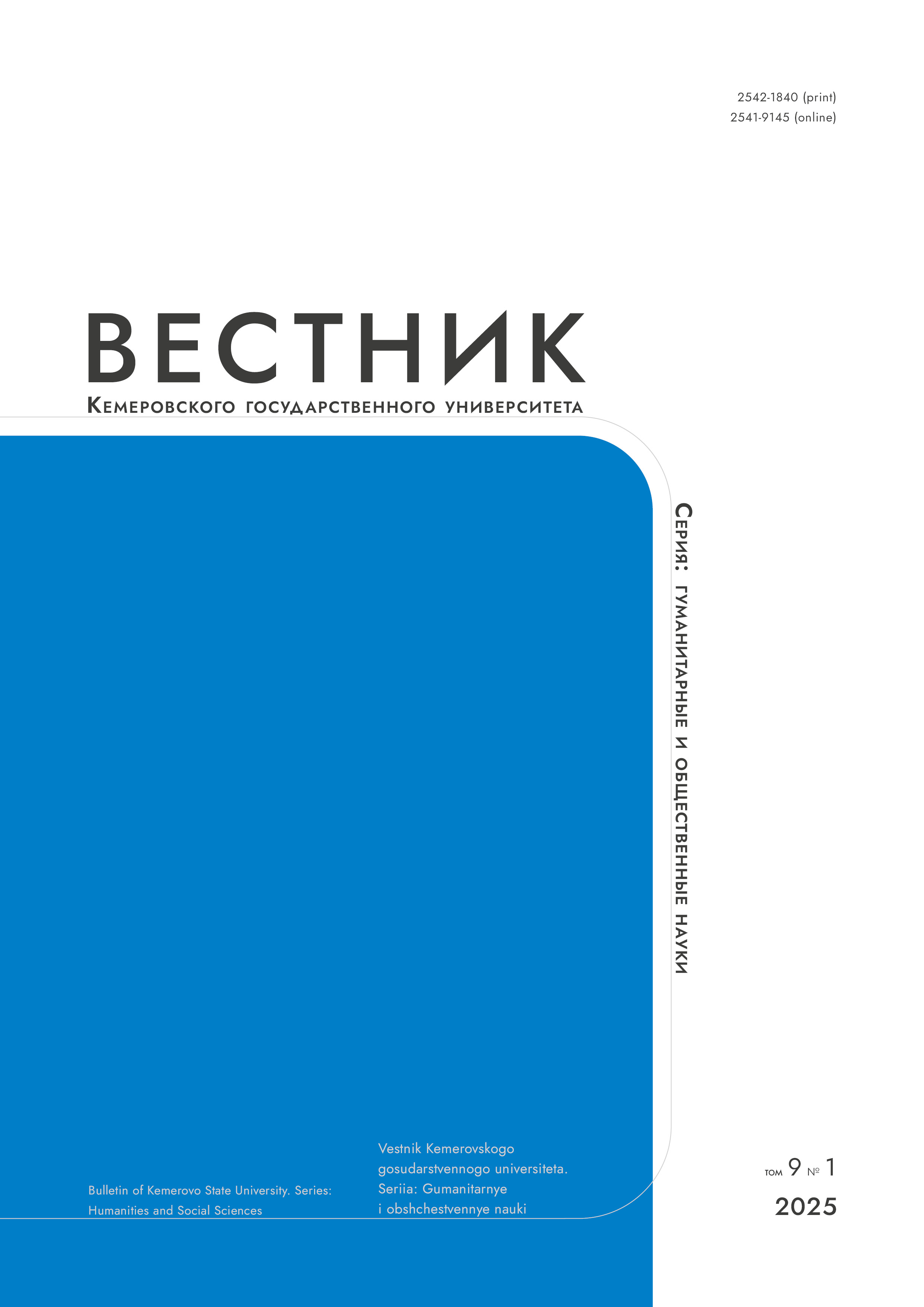Novokuzneck, Kemerovo, Russian Federation
Modern students are often required to be able to write an essay on a socially significant topic, which is important for their personal identification and future career. However, school or university curricula seldom provide special courses in creative writing. This article introduces a methodological training model for schools and universities based on a literary review and sample texts. The research focuses on the knowledge and skills that make up the content of teaching essay writing. Teaching social-topic essay skills includes several stages. Stage I develops the knowledge about personality and subjectivity. It teaches how to apply universal speech strategies, e.g., generalization of one's own life experience, opposition, contrast / continuity, self-contradiction, semantic interpretation, association, paradox, as-if strategy, epatage, etc. A similar list of universal tactics includes referencing and interpretation, illustrative proverbs, comparing different writers’ opinions, introducing scientific data / historical facts / biography details / examples from fiction and films / personal experience shared by many / facts about oneself and family, appeal, assumption, forecasting, expressing one’s personal impressions and feelings, etc. Another list includes mastering lexical, grammatical, and graphic means of expressing subjective modality. Stage II develops analytical skills based on sample texts with various linguistic means of self-expression. It also presupposes the task of writing a statement based on a combination of various speech and language means of self-expression. Stage III involves gaining experience in writing essays on socially significant topics: choosing speech strategies and tactics, applying linguistic means of subjective modality, etc. The research also clarifies the concept of personality as a category of self-expression, as well as determines effective speech strategies, tactics, and linguistic means of subjective modality in expressing one’s personality through an essay on a socially significant topic. In addition, the study offers a new methodology of speech development.
essays, personality, subjectivity, modality, speech strategies, speech tactics, communicative knowledge, communicative skills
1. Ladyzhenskaia N. V. Learning effective communication. Speech genres. A book for a teacher. Moscow: Iuventa; Balass, 2005, 175. (In Russ.) https://www.elibrary.ru/qvablp
2. Ladyzhenskaia T. A. System of work on the development of coherent oral speech of students. Moscow: Pedagogika, 1975, 255. (In Russ.)
3. Ladyzhenskaia T. A., Ladyzhenskaia N. V. Rhetoric lessons at school: teacher’s guide. Moscow: S-Info; Balass, 2000, 78. (In Russ.)
4. Methodology for teaching the Russian language at school, ed. Baranov M. T. Moscow: Akademiia, 2001, 368. (In Russ.)
5. Grebennikova E. V. Subjectness of personality: theoretical aspects of the problem. Tomsk State Pedagogical University Bulletin, 2013, (6): 140-142. (In Russ.) https://www.elibrary.ru/qzimdf
6. Loginovskaya Ju. V., Chernikova I. V. Language as a creative tool of consciousness. Language and Culture, 2022, (60): 57-81. (In Russ.) https://doi.org/10.17223/19996195/60/4
7. Zinevich N.V. The role of the category of subjectivity in the strategic organization of scientific discourse. Vesnik of Yanka Kupala State University of Grodno. Series 3. Philology. Pedagogy. Psychology, 2019, 9(1): 57-67. (In Russ.) https://www.elibrary.ru/yviswd
8. Akimova I. I. Russian language functional-semantic category of modality: system of values. Mir russkogo slova, 2016, (4): 30-36. (In Russ.) https://www.elibrary.ru/xrhief
9. Kukuyeva G. V. Self-presentation of language personality in the Internet-genre essay. Sibirskii Filologicheskii Zhurnal, 2019, (1): 252-264. (In Russ.) https://doi.org/10.17223/18137083/66/21
10. Iosilevich N. V. Language subject, speech subject and ego-category. Bulletin of Moscow state regional university. Series: Russian philology, 2011, (6): 21-24. (In Russ.) https://www.elibrary.ru/oyxiaf
11. Kolmogorova A. V. Incarnation in life and on stage: linguistic aspect. Vestnik Kemerovskogo gosudarstvennogo universiteta, 2015, (4-4): 97-101. (In Russ.) https://www.elibrary.ru/vbwtxx
12. Issers O. S. Communicative strategies and tactics of Russian speech. 6th ed. Moscow: LKI, 2012, 299. (In Russ.) https://www.elibrary.ru/ufdxfd
13. Borzova T. V., Mosunova L. A. Development of the national cultural identity of students of humanitarian specialties in the learning process. Perspectives of science and education, 2021, (6): 141-154. (In Russ.) https://doi.org/10.32744/pse.2021.6.10.
14. Kremer I. Ju., Chernyavskaya E. S. The comparative analysis of the actualization of the author’s personality in the narrative and critical texts. Scientific research and development. Modern communication studies, 2019, 8(3): 73-78. (In Russ.) https://www.elibrary.ru/ztkoqi
15. Obdalova O. A., Levashkina Z. N. "Narrative" as a cultural phenomenon and an object of discursive activity. Language and Culture, 2019, (48): 332-348. (In Russ.) https://doi.org/10.17223/19996195/48/21
16. Nurkova V. V. Self-defined Narratives in Personality Development. Psychological Science and Education, 2014, 19(4): 22-30. (In Russ.) https://www.elibrary.ru/tdybtn
17. Glazkov A. V., Glazkova E. A. Narrative texts and their uses in comparative reading. Russian Language at School, 2017, (1): 17-22. (In Russ.) https://www.elibrary.ru/xwwmov
18. Dresvyanina S. D. Actual experiments of textual activity in speech practice of high school students. Tomsk State Pedagogical University Bulletin, 2018, (2): 162-168. (In Russ.) https://doi.org/10.23951/1609-624X-2018-2-162-168
19. Abregova A. V., Kenetova R. B., Teuvazhukova R. A. Ways of expressing modality in languages of different types (English, Russian and Kabardian-circassian). Kazan Science, 2020, (11): 121-125. (In Russ.) https://www.elibrary.ru/vmabvq
20. Astashchenko E. V. Contextual features of the irreal modality in the Russian language. Baltic Humanitarian Journal, 2021, 10 (1): 321-326. (In Russ.) https://doi.org/10.26140/bgz3-2021-1001-0076
21. Akimova I. I., Grigorova E. A. Didactic-linguistic description of internal syntactic modality of the Russian language. International Research Journal, 2019, (12-2): 169-173. (In Russ.) https://doi.org/10.23670/IRJ.2019.90.12.082
22. Shcherbatiuk E. E. Brief comments on similarity and difference of modality category in Russian and German. Tambov University Review. Series: Humanities, 2001, (3-5): 39-42. (In Russ.) https://www.elibrary.ru/nucbnz

















